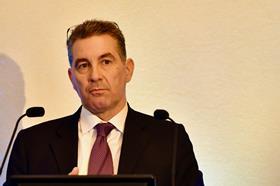The chief executive of the Solicitors Regulation Authority urged expert witnesses gathered for their annual conference to call out unethical conduct by solicitors and other witnesses. However, Paul Philip stopped short of committing to a new process for experts to report solicitors to the regulator, which an overwhelming majority of experts say they want.
This year’s Bond Solon Expert Witness Survey found that over a third of experts had encountered ‘hired guns’ - experts who tailor their views to fit their paymaster’s case - even though an expert’s duty is to the court. One in four also said they had been pressured by solicitors to produce biased opinions.
‘It is not the job of the expert witness to assist the claim and the instructing solicitors should not be acting in any way that would undermine your impartiality or your independence as an expert witness,’ Philip told last Friday’s conference. ‘They should never be putting an expert under pressure to change the substance of the evidence, or particularly, to benefit the claim or to benefit the client.’
It is also ‘vital’, Philip said, that ‘any potential conflict of interest and information that could undermine the credibility of any witness is disclosed to the court and others before the expert gives evidence’.

Over 90% of survey respondents said they favour a process for experts to notify the SRA of problems arising with solicitors. Philip did not address this demand directly, but added: ‘If the solicitor’s putting pressure on you…I think it’s the type of thing you really ought to report to the SRA. If these things go unchecked, they will just continue. And quite frankly, the only way to get the solicitor to pay attention is to draw the attention of the regulator in relation to that.’
This year’s survey also highlighted complaints of non-payment by solicitors of experts’ fees. If the expert has exhausted the solicitor firm’s internal complaints process, said Philip, their next ‘port of call’ is the Legal Ombudsman. But he added: ‘Non-payment of fees may well be a regulatory matter, if it’s serious, there’s a lot of money [involved], or it’s persistent - if it’s happening all the time. We would want to look at this if those things were in play. But bear in mind, as always, it needs to be provable..you need to have a good audit trail.’
Philip did not have figures to hand about complaints to the regulator specifically from expert witnesses. However, it is understood that the number is under 25 for the last three business years, equally split between ‘undue influence’ and non-payment of fees. None has led to a sanction.
This year’s conferrence came amid renewed scrutiny of the reliability of evidence given by experts, in light of the Lucy Letby trial and the Post Office Inquiry.
Sam Townend KC, chair of the Bar Council, told the event: ‘We’re currently at something of a crisis point, where more needs to be done to ensure that experts and the courts are satisfied that objective, independent, technical and other expert evidence is there, and to avoid the sometimes binary consequences for parties that follow where the court concludes that one party’s experts are not complying with their primary duty to the court.’
Townend advanced three ‘new solutions’ to the problem. ‘One is potentially to remove the privilege associated with expert -generated documents. That would give a level playing field. You would know where you stand. It’s something that they do in Australia.
‘Another possibility is having more consistent requirements procedurally for joint meetings, statements and so on. A third thing is to restore the use of litigation experts - you come in for the trial to give your independent view [and] you’re not tied to a particular party.’
This article is now closed for comment.



























19 Readers' comments